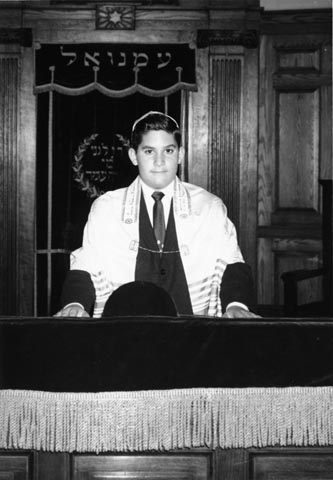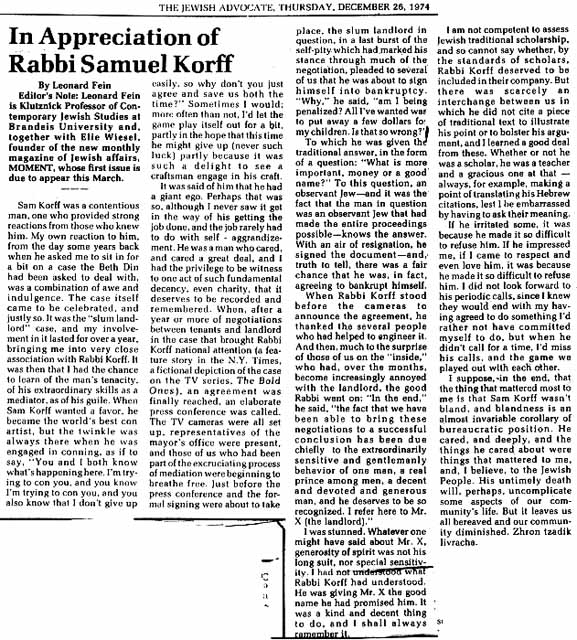
| A Great Leader is Lost |
 |
 |
|
Samuel Korff did not live long enough to celebrate the Bar Mitzvah of his grandson Michael. |
On December 18, 1974, Samuel Korff died at Massachusetts General Hospital. An honor guard of Boston firefighters escorted the funeral cortege. Rabbi Albert S. Axelrad, the chaplain and advisor to the B'nai B'rith Hillel Foundation at Brandeis University wrote a tribute The Jewish Advocate.
"When Rabbi Samuel Korff died in December 1974, the Jewish community of Boston and beyond sustained a profound loss. I offer this not as a personal testimonial, for during the decade in which our paths crossed professionally, he and I never came to know each other well, but rather from an ideological and communal point of view. During these ten years I have grown to admire his very refreshing orientation to Judaism and the Jewish people, and to respect the progressive and courageous leadership he provided. Rabbi Korff was a rarity in my eyes--one we can ill afford to lose.
"What were his distinctions?
"To begin with, he was an Orthodox rabbi, with a characteristically and predictably strong commitment to Orthodoxy and halacha (Jewish law). At the same time, however, he was a tolerant, open-minded pluralist, devoted to the concept of k'lal Yisrael (the community of all Israel). His Orthodoxy never led him into the dark alleys of pettiness and bigotry, of self-righteousness and rigidity. He avoided the pitfall of offensive military zeal toward his fellow Jews. For example, I cannot imagine him applying the label Ba'al teshuvah (penitent sinner) with its obnoxious implication to any Reform or otherwise positively identified Jew who later turned to Orthodoxy. Rather, while maintaining his own personal and rabbinic commitment to Orthodoxy, Korff consistently gave evidence of accepting and respecting all positive approaches to Orthodoxy--Reform, Conservatism, Reconstructionism, etc. This much is integral to the basic theory behind the organization Korff directed, the Associated Synagogues of Massachusetts, and in his approach to the problem of Jewish religious conflict. Such solid commitment to Orthodoxy, coupled with openness and tolerance, represents to me a breath of fresh air, a quality of traditional Jewish leadership worthy of esteem and emulation.
 |
|
Reprinted courtesy of The Jewish Advocate. |
"Korff was distinguished in yet another way. He insisted in applying Judaism's ethical, social, and legal tradition to the very real and difficult problems of contemporary society. He was never one to shrink from confronting real problems, thus exerting a positive impact on sensitive, socially and morally concerned traditional Jews, He represented the best in Orthodoxy--a serious concern with ritual and observance on the one hand, and a commitment to making connections between Jewish law and societal issues on the other--both of which are vital elements inherent in Jewish law and learning. Never was he party to the spurious bifurcation between ritual and morality. For Jews who gravitate toward both Jewish observance and social involvement, the Korff model was singularly relevant and inspiring....
"[Korff's] involvement in the affairs of man was always progressive and compassionate, humanistic and life-affirming. Never would he abandon our tradition's very central justice-oriented, peace-pursuing and people-loving precepts in favor of illusory self-serving values like narrowly and ephemerally defined notions of Jewish self-interest. The singular direction and landmark decisions of the Boston Bet Din under Korff's leadership in such verdicts as the condemnation of slum leadership and the affirmation of conscientious objection are tributes to the breadth of his Jewish vision...
"I always admired the tenacity and resourcefulness with which Korff struggled for support and for a place on the map for his undernourished and undersupported agency, the Associated Synagogue...[and] I appreciated the honesty and depth of Korff's interest in Hillel, in Jews and Jewish life on campus. He did not pay lip service to our cause and constituency but showed real concern, manifest in his consistently coming to our aid despite his very meager funds, his always sympathetic and supportive shoulder, his limitless availability as a Jewish resource and his largely unknown tendency to meet privately and regularly for Jewish study with small clusters of interested Jewish students. Like his other concerns, Korff's commitment to the campus and its Jews was genuine and refreshing. He and I together always lamented the fact that he didn't find himself in a position of real influence vis-à-vis the allocation of Boston Jewry's considerable communal funds. How refreshingly different and correct our communal priorities would have been.
"What a monument it would be to Samuel Korff if
there were to emerge from Boston a corps of Jewish leaders dedicated to
observing, developing, and applying the traditions of Judaism, representing
Jewish religious tolerance, open- mindedness and pluralism, upholding an
up-dated appreciation of the classical concept, Elu v'elu divrei Elokim
Chayyim (that the variety of positive approaches to Judaism are all the
words of the Living G-d)--an accepting, loving view and vision of the whole
household of Israel--and committed to progressive social change in line with
Judaism's ideals."
[1]
Twenty years after the death of Samuel Korff, the loss of this great man is still lamented by his family and by the Jewish Community of New England. Rabbi Harold S. Kushner, a Conservative rabbi and the noted author of When Bad Things Happen to Good People, and other best-selling books, explained why:
"When I moved to Boston from Long Island in the
summer of 1966 to become rabbi of Temple Israel in Natick, I began to hear of
Rabbi Korff in terms of his position with the Vaad HaKashrut, the Bet
Din, and the Associated Synagogues. Coming from New York, I had a certain
suspicion of Orthodox rabbis and their tendencies to be standoffish and
patronizing toward their non-Orthodox colleagues.
"But Rabbi Korff's reputation was different. I
was impressed by his success in centralizing kashrut under the Vaad.
In Long Island, kashrut supervisors were employed by the kosher caterers
they were supposed to be supervising, and were not taken seriously. I was even
more impressed by the Bet Din and Rabbi Korff's willingness to speak out
on social issues usually not confronted by Orthodox courts.
"My real contact with Sam Korff came in 1971-73, when I was president of the New England Region of the Rabbinical Assembly, the organization of Conservative rabbis. Rabbi Korff contacted me with a plan he had thought up to centralize conversion procedures in New England. With typical boldness, he floated the idea of having potential converts appear before a panel of five rabbis, three of them Orthodox or perhaps two Orthodox and three liberal, with one of the liberal rabbis being a graduate of an Orthodox institution. If the potential convert satisfied this tribunal of five, a traditional immersion would follow and the rabbis would all sign the convert's documents. The three Orthodox musmachim would make the document acceptable in Israel and in Orthodox circles. I was very excited by this prospect and began to discuss it with colleagues.
"Unfortunately, before anything could come of it, Rabbi Korff took ill and had
to leave his position. He died shortly afterward. Twenty years later, I feel the
community would still benefit from someone of his vision and stature in a
position of authority, as it did for many years."
[2]
In 1974, Samuel Korff died at the age of 62. Nesha took it hard, and eventually left Boston.
"My husband was a very energetic person. Three times we were in Israel. Each time I didn't feel like going because I am not a good traveler. When he came home the last time, he took sick. After he died, I was afraid to sleep alone in the house. Later, I moved to Brooklyn."